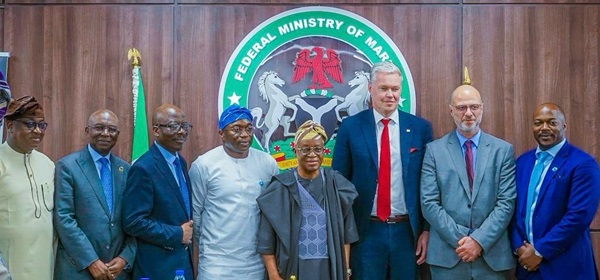
In a decisive move to strengthen Nigeria’s maritime industry, create employment and deepen indigenous participation, the Minister of Marine and Blue Economy, Adegboyega Oyetola, has declared his intention to end the issuance of waivers under the Coastal and Inland Shipping (Cabotage) Act of 2003.
The Cabotage Act restricts domestic coastal shipping operations to vessels that are Nigerian-owned, -crewed, -built, or -flagged. However, over the years, successive administrations have routinely granted waivers to foreign-owned vessels on the grounds of limited local capacity. This practice has stifled the growth of Nigerian shipping companies, depriving them of critical opportunities to expand and compete.
Speaking in Abuja during a visit by a high-level delegation from NNPC Shipping, global maritime giant Stena Bulk and Caverton Offshore Support Group, Oyetola expressed firm resolve to change the narrative.
The visit followed the unveiling of Unity Shipping World (USW), a new joint venture between NNPC Shipping, Stena Bulk and Caverton. The partnership aims to build a formidable tanker operation capable of transporting crude oil, refined petroleum products, and liquefied natural gas (LNG) within Nigeria, across West Africa and to international markets.
“The era of indiscriminate waivers is drawing to a close,” Oyetola said. “We cannot continue to weaken our local capacity under the pretext of foreign intervention. The path forward is clear – we must build Nigerian tonnage, protect Nigerian jobs and give our indigenous operators the competitive edge they deserve.”
He noted that as part of efforts to boost local capacity, he had already instructed the Nigerian Maritime Administration and Safety Agency (NIMASA) to begin the disbursement process for the Cabotage Vessel Financing Fund (CVFF). The CVFF, which has accumulated from Cabotage levies over time, is aimed at supporting Nigerian shipowners in acquiring modern vessels and expanding operational capacity.
“The disbursement of the CVFF is no longer optional – it is a strategic necessity,” Oyetola said. “We must ensure that Nigerian companies can fill the gap that will be left as we phase out these waivers. Empowering our operators is the only sustainable solution.”
Oyetola also reiterated his plan to establish a national shipping carrier through a public-private partnership (PPP), positioning Nigeria as a leading maritime force in the Gulf of Guinea and beyond.
CEO of Caverton Offshore Support Group, Bode Makanjuola hailed the Unity Shipping World joint venture as a milestone for Nigeria’s maritime future. He said the partnership will deliver efficient, safe, and sustainable transport services, with a strong emphasis on capacity-building and cost optimisation.
“This is more than a business alliance – it is a strategic intervention,” Makanjuola said. “We will build a modern fleet, acquire both new and existing vessels, and meet NNPC’s growing logistics demands. We will also serve other oil producers, traders and energy clients.”
He emphasised that Unity Shipping World will prioritise the training and inclusion of Nigerian seafarers, adding, “This joint venture proudly flies the Nigerian flag. It combines local knowledge with international expertise and will play a key role in empowering our people and raising industry standards.”
Managing director of NNPC Shipping, Panos Gliatis said the partnership would strengthen Nigeria’s refining, import and export capabilities, reinforcing the country’s role in global energy supply chains.
“With this alliance, we are not only strengthening logistics; we are building a new era for Nigeria’s energy movement,” Gliatis said.
Echoing this view, Stena Bulk’s president, Erik Hånell affirmed the company’s commitment to the partnership and to Nigeria’s shipping ecosystem.
“This venture fits perfectly into our global strategy,” Hånell said. “Together, we will champion operational excellence while helping to reshape Nigeria’s energy logistics landscape.”
With these developments, stakeholders believe Nigeria’s maritime sector may finally be on course for the transformation it has long awaited – driven by political will, local investment and global collaboration.

